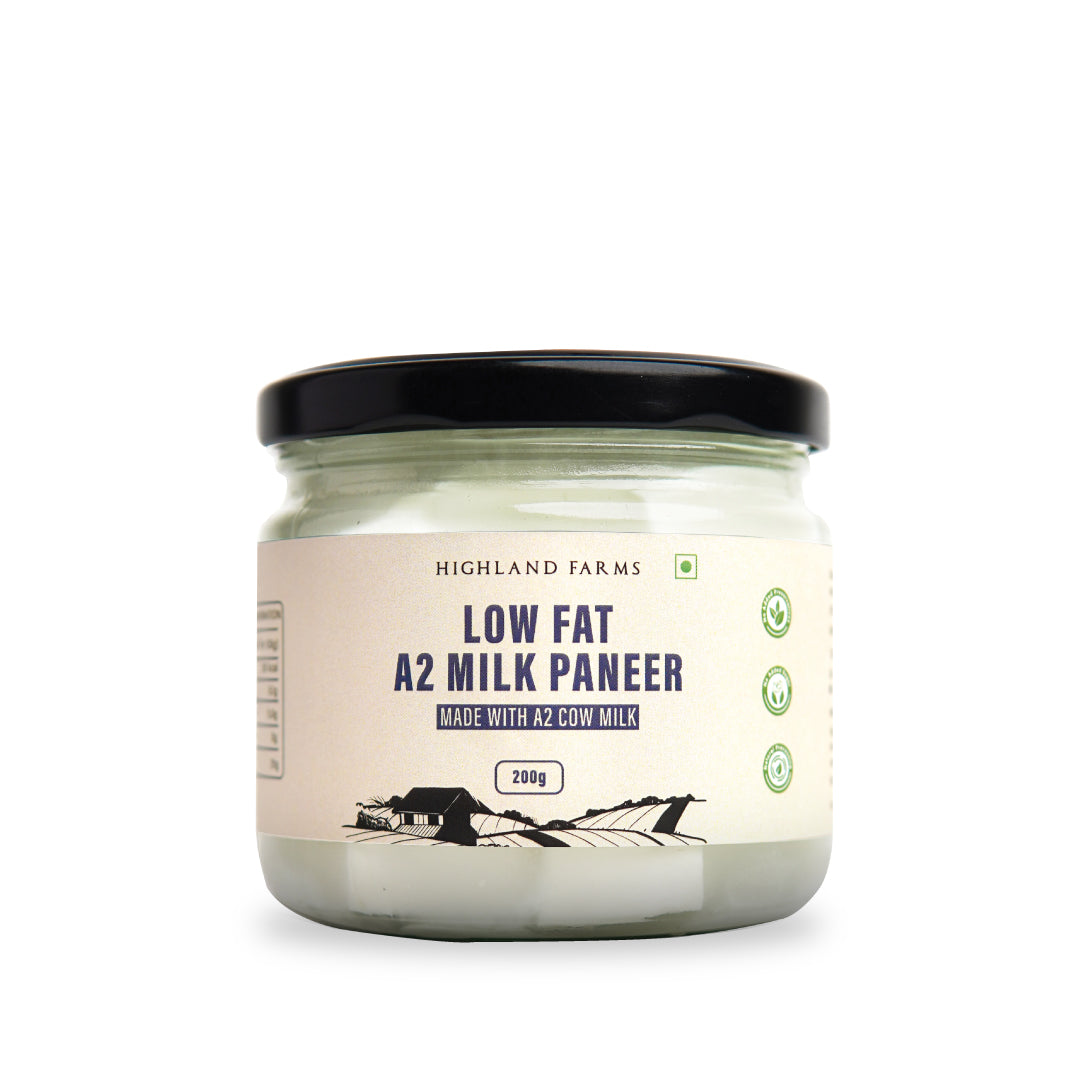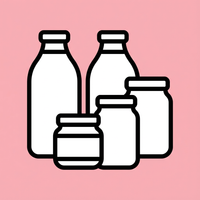Walking through the dairy aisle, I've often wondered about the story behind each block of paneer. What makes one brand different from another? After diving deep into Highland Farms' quality process, I discovered there's a fascinating world of precision, tradition, and innovation that goes into creating their A2 paneer. For health-conscious consumers like myself who worry about additives, processing methods, and source authenticity, understanding this process has been truly enlightening.
In this article, I'll take you through Highland Farms' comprehensive approach to ensuring purity and quality in every A2 paneer block – from their free-range cows grazing in the Aravalli region to the moment their products reach your kitchen.
Table of Contents
● Highland Farms Quality Philosophy
● Source: Free-Range A2 Cows
● Traditional Paneer Making Methods
● Quality Control at Every Step
● Cold Chain Logistics
● Packaging and Preservation
● Testing and Certifications
● Customer Quality Assurance
● Frequently Asked Questions
Highland Farms Quality Philosophy
Commitment to Purity
When I first learned about Highland Farms' approach, what struck me most was their
unwavering commitment to purity. In an industry where shortcuts are common, they've chosen a path that prioritizes quality over quantity. Their philosophy centers on the belief that authentic dairy products shouldn't require artificial additives or preservatives to be exceptional.
This commitment isn't just marketing speak – it's evident in every aspect of their operation. From the selection of their A2 cows to the final packaging, every decision is made with purity in mind. As someone who values clean eating, I appreciate how they've maintained traditional methods while incorporating modern quality standards.
Traditional Methods, Modern Standards
Highland Farms has mastered the art of balancing time-tested techniques with contemporary quality control measures. Industrial scale paneer manufacturing has evolved significantly, with facilities now employing advanced systems like twin-flanged apron conveyor cum filtering systems, yet Highland Farms chooses to honor traditional methods wherever possible.
Their approach reminds me of my grandmother's cooking – she never needed fancy equipment to create exceptional food, but she understood the importance of quality ingredients and patient preparation. Highland Farms applies this same philosophy on a commercial scale.
Source: Free-Range A2 Cows
A2 Cow Selection Process
The foundation of exceptional paneer lies in exceptional milk, and Highland Farms understands this better than most. Their journey begins with carefully selected Desi cows that naturally produce A2 milk. Unlike conventional dairy operations that focus on high-yield breeds, Highland Farms prioritizes the genetic authenticity of their cows.
Natural Grazing and Care
What sets Highland Farms apart is their commitment to natural grazing in the Aravalli region. I've always believed that happy, healthy animals produce better milk, and Highland Farms proves this theory. Their cows roam freely across natural grasslands, feeding on native
The Aravalli hills provide an ideal environment – clean air, natural water sources, and diverse flora that allows the cows to maintain their natural behaviors. This isn't just about animal welfare (though that's certainly important); it directly impacts the quality of the milk and, consequently, the paneer. vegetation that contributes to the rich nutritional profile of their milk.
Learn About Our A2 Paneer - Highland Farms Product Collection
Traditional Paneer Making Methods
Time-Tested Techniques
There's something beautiful about watching traditional paneer-making methods in action.
Highland Farms has preserved these time-honored techniques that have been passed down through generations. The process begins with gently heating the A2 milk to the optimal temperature – not too hot to destroy beneficial properties, not too cool to prevent proper coagulation.
Milk is coagulated by lime juice, citric acid solution, sour whey, or lactic cultures, with paneer pH typically maintained at 5.7–6.0. Highland Farms carefully controls this critical step, ensuring consistent quality across every batch.
No Artificial Additives
In my research, I was impressed to learn that Highland Farms uses no artificial additives,
preservatives, or shortcuts in their paneer production. While many commercial producers rely on stabilizers and preservatives to extend shelf life, Highland Farms trusts in their superior cold chain logistics and fresh production cycles to maintain quality naturally.
This commitment to purity means their paneer has a shorter shelf life than heavily processed alternatives, but the trade-off is worth it. Paneer keeps well only for about a day at ambient temperature and for about a week under refrigeration at 7°C, which is why their logistics system is so crucial.
Handcrafted Excellence
What fascinates me most about Highland Farms' process is how they've scaled handcrafted quality to commercial production. Each batch receives personal attention from experienced dairy artisans who understand the subtle signs of perfect coagulation, proper texture development, and optimal pressing timing.
This human touch is something that automated systems, no matter how advanced, cannot
replicate. It's this attention to detail that ensures every block of Highland Farms paneer meets their exacting standards.
Quality Control at Every Step
Highland Farms implements rigorous quality control measures throughout their production process. Here are the key checkpoints they maintain:
- Temperature Monitoring - Continuous tracking during heating, coagulation, and cooling phases
- pH Balance Verification - Ensuring optimal acidity levels for proper texture and taste
- Milk Reception Testing - Every batch of A2 milk undergoes comprehensive testing for purity, fat content, protein levels, and bacterial count
- Weight and Packaging Checks - Verifying accurate portioning and seal integrity
- Final Quality Assessment - Complete evaluation before cold chain dispatch
- Visual Inspection - Expert evaluation of color, texture, and consistency at multiple stages
Quality Parameters and Standards
|
Parameter |
Highland Farms Standard |
Industry Average |
|
Protein Content |
21.4g per 100g ( Highland Farms Low Fat Paneer ) |
18-20g per 100g |
|
Fat Content |
3-5g per 100g (low-fat variant) |
20-25g per 100g |
|
Moisture Content |
60-65% |
55-70% |
|
pH Level |
5.7-6.0 |
5.5-6.2 |
|
Bacterial Count |
<100 CFU/g |
<1000 CFU/g |
|
Shelf Life |
7 days refrigerated |
3-5 days |
These standards demonstrate Highland Farms' commitment to exceeding industry norms.
Cold Chain Logistics
Temperature Control Systems
The cold chain logistics market is projected to reach $340.3 billion by 2025, driven by consumer demand for longer shelf-life dairy products. Highland Farms has invested heavily in this critical aspect of their operation, understanding that the best paneer in the world is worthless if it doesn't reach customers fresh.
Their temperature control systems maintain a consistent 2-4°C throughout the entire logistics chain. From the moment paneer leaves their production facility until it reaches your doorstep, sophisticated monitoring systems track and record temperatures to ensure product integrity.
Freshness Preservation
What impressed me most about their logistics approach is the attention to detail. With
heatwaves reaching 43°C and rising diesel costs putting pressure on cold storage and logistics in 2025, companies like Amul are investing in solar-powered cold storage solutions. Highland Farms has similarly innovated their approach to maintain freshness despite challenging environmental conditions.
Their vehicles are equipped with advanced refrigeration systems, and delivery routes are
optimized to minimize transport time. This ensures that customers in Delhi, Gurgaon, Noida, and Mumbai receive paneer that's as fresh as if it came straight from their production facility.
Delivery Standards
Highland Farms maintains strict delivery standards that go beyond just temperature control. Their delivery personnel are trained to handle products carefully, ensuring packaging remains intact and products are delivered within optimal timeframes. This comprehensive approach to logistics is part of what makes Highland Farms stand out in the competitive dairy market.
Packaging and Preservation
Highland Farms uses high-quality glass packaging – a choice that speaks to their commitment to both quality and environmental responsibility. Glass packaging offers several advantages over plastic alternatives:
● Superior Freshness - Better seal integrity maintains optimal freshness longer
● No Chemical Migration - Glass is completely inert, ensuring no unwanted flavors or
Chemicals leach into the paneer
● Environmental Sustainability - Glass is infinitely recyclable, aligning with
eco-conscious consumer values
● Visual Quality Assessment - Transparent packaging allows customers to inspect
product quality
The packaging process itself is conducted in controlled environments to minimize contamination risk. Each package is sealed using advanced techniques that create an optimal microenvironment for the paneer while allowing for easy opening by consumers.
Testing and Certifications
Highland Farms subjects their products to comprehensive testing protocols that exceed industry standards. Their testing laboratory evaluates:
● Microbiological Safety - Screening for harmful bacteria, yeasts, and molds
● Nutritional Accuracy - Verifying protein, fat, and vitamin content claims
● Chemical Residues - Testing for any unwanted chemical compounds
● Sensory Evaluation - Professional taste and texture assessment
● Shelf Life Validation - Monitoring product quality over time
These rigorous testing procedures ensure that every Highland Farms product meets not just their internal standards, but also exceeds regulatory requirements. The company maintains certifications from relevant food safety authorities and regularly undergoes third-party audits to validate their quality systems.
Customer Quality Assurance
Highland Farms' commitment to quality doesn't end when the product leaves their facility. They maintain an active customer feedback system that helps them continuously improve their processes. Their quality assurance program includes:
● Complaint Resolution System - Rapid response to any quality concerns
● Continuous Improvement - Using customer insights to refine production processes
● Product Recall Capabilities - Comprehensive traceability systems enable quick response if needed
● Customer Satisfaction Surveys - Regular feedback collection to identify improvement opportunities
This customer-centric approach to quality assurance demonstrates Highland Farms'
understanding that true quality is measured by customer satisfaction, not just internal standards.
Frequently Asked Questions
How does Highland Farms ensure paneer quality?
Highland Farms ensures quality through a comprehensive approach starting with A2 cow selection, traditional production methods, rigorous testing at every stage, temperature-controlled logistics, and premium glass packaging. Their multi-step quality control process includes milk testing, pH monitoring, bacterial count verification, and final product assessment before dispatch.
What makes Highland Farms A2 paneer different?
Highland Farms A2 paneer is made
exclusively from milk of free-range Desi cows that naturally produce A2 beta-casein protein. Combined with traditional production methods, no artificial additives, and superior cold chain logistics, this creates paneer with better digestibility, authentic taste, and superior nutritional profile compared to conventional alternatives.
How does cold chain shipping preserve paneer quality?
Enhanced cold chain infrastructure minimizes waste and guarantees high-quality milk for paneer manufacturing. Highland Farms maintains consistent 2-4°C temperatures throughout storage and transportation, uses advanced refrigerated vehicles, optimizes delivery routes for minimal transport time, and employs continuous temperature monitoring to ensure products reach customers with maximum freshness and quality intact.
Why does Highland Farms use glass packaging?
Glass packaging ensures no chemical migration into the paneer, provides superior freshness preservation, is environmentally sustainable through infinite recyclability, and allows customers to visually assess product quality. This premium packaging choice reflects Highland Farms' commitment to both product quality and environmental responsibility.
How long does Highland Farms paneer stay fresh?
Highland Farms paneer stays fresh for up to 7 days when properly refrigerated at 4°C or below. The exact shelf life depends on handling and storage conditions. Their superior cold chain logistics and preservation methods
extend freshness compared to conventional paneer, which typically lasts 3-5 days under similar conditions.
Conclusion
Highland Farms' approach to A2 paneer production represents a perfect marriage of traditional wisdom and modern quality systems. Their commitment to purity – from free-range A2 cows grazing in the Aravalli hills to temperature-controlled delivery at your doorstep – ensures that every block of paneer meets the highest standards of quality and freshness.
What impresses me most about Highland Farms is their understanding that true quality cannot be compromised. In an industry where shortcuts are tempting, they've chosen the harder path of authentic production methods, rigorous quality control, and comprehensive customer care. This dedication results in A2 paneer that not only tastes exceptional but also provides the nutritional benefits and digestibility that health-conscious consumers seek.
For those of us who care about what we put into our bodies, Highland Farms offers peace of mind. When you choose their A2 paneer, you're not just buying a dairy product – you're investing in a philosophy of purity, tradition, and unwavering quality standards.
Ready to experience the Highland Farms difference? Order with confidence from their
quality-assured A2 paneer collection and taste the purity that comes from uncompromising standards and traditional craftsmanship.













0 comments